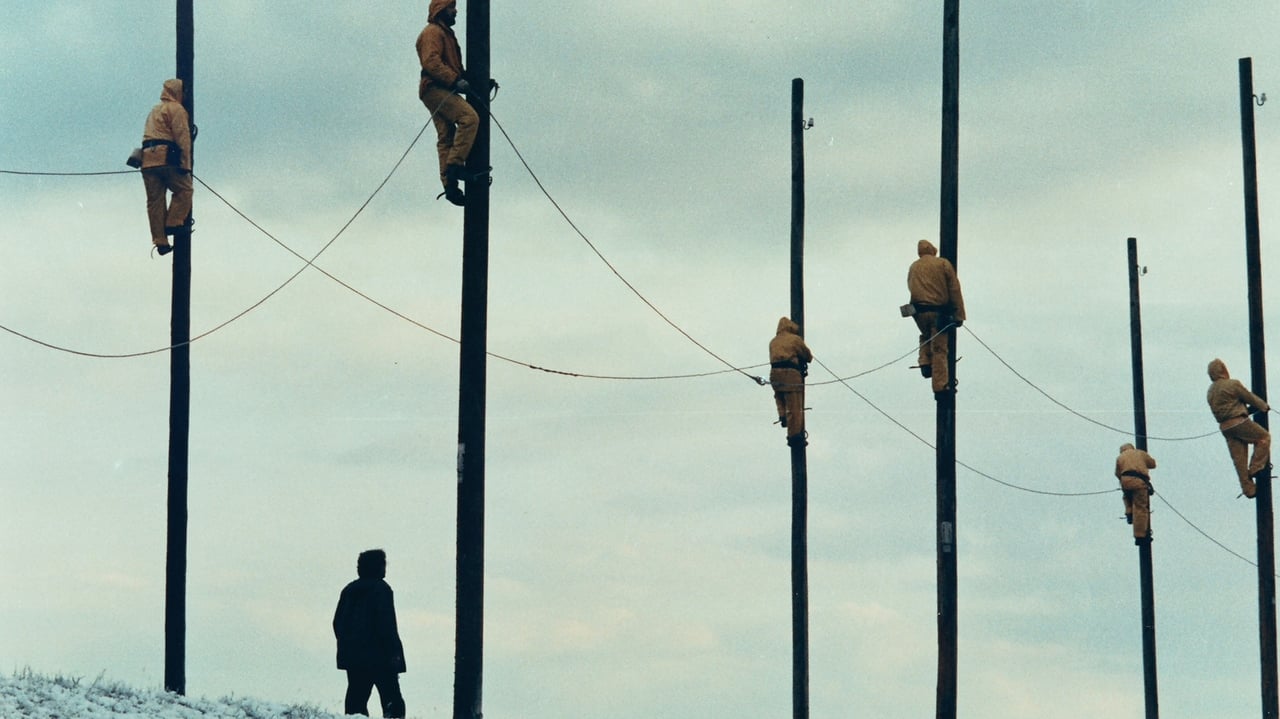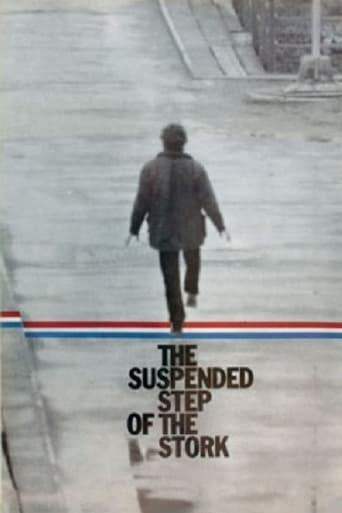

Best movie ever!
... View MoreThe performances transcend the film's tropes, grounding it in characters that feel more complete than this subgenre often produces.
... View MoreExactly the movie you think it is, but not the movie you want it to be.
... View MoreStory: It's very simple but honestly that is fine.
... View MoreOur house is your house. Our house ... We passed the borders and we are still here. But how many borders must we pass to go to our home?This particular phrase from the unforgettable Theo Angelopoulo's film sums up the whole meaning of the film and the Trilogy of borders.Alexandros a TV reporter armed with the energy of the youth seeks a missing politician in a border town.The town is full of people from many ethnicities among them there is the politician(Marcelo Mastoioanni).His character a talented writer and politician disappears mysteriously and leaves everything behind to seek the very place which will make him happy,he seeks a home.The film title is a reference on the fatal step that people may take to cross the borders literally and not,the thoughts in that hour and danger of doing the step or fending off from it.Mastoioanni's character for another time in the end of the film takes the step of the stork and goes in another journey crossing borders once more.One of the best movies of Theo Angelopoulos.Unlikely from the most of his films,here the dialog serves the plot smoothly.The actors marry words with emotions.The beautiful landscape photography makes the movie even more beautiful.Although as all Angelopoulos movies the action is reduced.The mainstream viewer might get bored as it is a cult film with deep emotional scenes.Humanism dominates as people are the center of the films's axis.People have to overcome all the borders in their way even if they are guarded from soldiers.The movie with a simple plot delivers deep messages who change everyones way of thinking.All in all one of the greatest Greek films of the century.Highlight of the film: The Suspended Step of the Stork on the board line of Evros and the odd wedding across the river.
... View MoreAs with all of Angelopoulos' films, "The Suspended Step of the Stork" implicitly demands a close and intimate participation on the part of the viewer, a fact that has certainly contributed to the limited popularity of his work. Dialogues are sparing, with no monologues or exchanges exteriorizing the characters' inner conflicts, doubts, or feelings. The filmmaker prefers to keep the viewers away from their own emotional responses, and instead forces them to explore and study the characters' identities for themselves. As a result, the acting is understated and implicit, as opposed to overt and explicit.The action scenes are set between long intervals of contemplation, where the viewer is asked to become a participant, to participate as an actor, by probing his or her own psyche. As in a novel, where the drama rests entirely on the author's writing to provide a template where the reader's imagination and/or past experience flourish, Angelopoulos' drama rests within his images: his uses of the long shots, the long takes, the leisurely pacing, the sparing dialogues that have become his trademark, inviting the viewer to experience the film from his or her personal perspective. Angelopoulos uses silence to capture moments of high intensity, reverting to the non-verbal language of gestures, gazes, sounds, and music, when he believes that words can only take us so far.The music, by Angelopoulos' long time collaborator, Eleni Karaindrou, provides more than just a discreet background, but becomes itself a dramatic element of the story. A large part of the film consists of exterior shots in subtle, subdued colors, recorded in a drab winter light. Angelopoulos presents us with an "other Greece," one far different from the Greece of the tourist brochures, with ethereal blue skies and emerald seas, drowned in an eternal sunshine. Here, the skies are covered and gray, the air is cold and misty, and the sands of the pristine beaches have been replaced by the trampled, dirty snow of the village streets. Angelopoulos' genius through Arvanitis' camera is on display throughout the film."The Suspended Step of the Stork" is above all else a political statement aimed at the socio-political situation in the Balkans at the end of the twentieth century. It is deeply concerned with the meaning of "borders," and with those who are the victims of the confusion between nations. In the "waiting room" facing the Albanian border, the refugees, political or other, outcast by the rest of humanity, wait. They may be stuck against a political border, but unfortunately they still carry with them, and hang on, deeper ancestral borders: those of the languages, of the customs, and of the races. Although Angelopoulos' political views are well known, the film steers clear of any political discourse regarding the causes of the refugees' plights. In the process, Angelopoulos forces us to meditate on the concepts of geographical, cultural, political, and personal "borders." Angelopoulos considers himself a historian of twentieth century Greece, and he likes to bring lessons from the Hellenic myths into his discussions. In this film, he does some border crossing himself between the Greek and Italian cultures, drawing from a combined Homeric and Dantesque tradition of Odysseus' travel. Alexander is a Telemachus, in search of a story about an aging Greek politician/Odysseus who disappeared, never to be heard of again. This political man, a brilliant orator, unexpectedly and inexplicably left the comfort of his bourgeois existence, his wife, and his brilliant career, to live anonymously in a refugee camp with the lowest of the low. He became a poet in exile wondering how to change the world. Of course, the "politician" is not Alexander's father, but the "politician" stands before Alexander like a father figure/Odysseus. As with Homer's Telemachus, Alexander grows as a person during his odyssey.Of course, it would be wrong to try and see in the film a retelling of Homer's Odyssey in a contemporary context. Angelopoulos draws on Odysseus's travels only as structuring and thematic elements for his film. In Angelopoulos' ending, "Odysseus" is more like the Dante's Odysseus: he does not leave for Ithaca but goes on, "carrying a suitcase." And Alexander/Telemachus is "suspended" between returning to his home and his career, or embarking on a voyage to "somewhere else." He states as much, in a voice-over at the beginning of the film, paraphrasing few lines from Dante's "Inferno": "And don't forget that the time for a voyage has come again. The wind blows your eyes far away." Finally, although Angelopoulos is not a religious person, there is a Greek Orthodox religious theme introduced during the film in the form of the yellow-suited linesmen, who go around bettering things for their fellow human beings by reconnecting communications, and also the Christ-like figure of the "politician." In the final scene, these men in yellow demonstrate once more the Byzantine iconography's influence in Angelopoulos' work. They appear like "stylites," religious figures found in the Orthodox tradition, solitary and fervent men who took up their abode upon the tops of pillars, in a form of asceticism.The film ends without a resolution as to the true identity of the character played by Mastroianni. Angelopoulos does not give us any clues, and the wife's statement, "It's not him," is far from convincing and left ambiguous enough. The important question of the film is not whether he is or is not the vanished politician, but that he could be the politician. But the film still ends on an optimistic note. Whereas the wires strung from pole to pole run only along the river, and thus communications across the border are still not possible, and it remains impenetrable, we note that this final scene is taken from a point of view across the river: the camera has crossed the border, and the reverse tracking shot is inviting Alexander and the viewer to follow beyond the boundary. On this account, Angelopoulos gives us hope that somehow, some of the borders will eventually crumble.
... View MoreQuestion: how does a bourgeois director treat a subject like immigration ? Answer: by turning it into an existential alienation parable.Yes, we're back in the early 90s, just after the disintegration of the Eastern block and the subsequent flooding of immigrants in the European Union, and what better way to deal with the subject than making a film about an existentially alienated middle-class journalist, an existentially alienated upper-class politician, his existentially alienated rich wife, and so on.In the background, immigrants are asking for political asylum in an unnamed Greek village near the borders. I guess that way Angelopoulos can show some social awareness, while dealing with the existentially troubled upper-classes. I mean honestly, the scene where some top-ranking army-officer curses his destiny cause he sent his daughter to study in London is enough to make you puke.Anyway, it can't be that bad, Angelopoulos is a master of the cinematic art after all, right ? Wrong. It's at this point when his mannerisms start getting too artificial, sort of like a filtered image in Photoshop. His usual tricks show up: there are blurred windows, blurred lights, a weird wedding, a walk by the river-shore, and people with yellow water-coats. Also Mastroianni breaks new ground for most sleepwalking performance ever. Avoid really. Go for his early films.
... View MoreA most recommendable masterpiece, not only for the underlying themes of the story but also for the unmatchably brilliant and ingenious picture work of Angelopoulos, not to mention the acting of giants, Mastroianni and Moreau, and the remarkable character play by Ilias Logothethis. Gregory Karr's performance may seem overshadowed by his "tough" partners' at first stance but in fact he perfectly plays his character, which is revealed in his very last scene with the girl (Khrysikou) and the man (Mastroianni), albeit hinted beforehand. (Hence the spoiler.)Get your expectations straight! It's an "art movie" in whatever meaning that phrase has to offer and requires attention. Not for spending free time, but for watching an artwork with the necessary concentration as in reading a book or attending a concert. Due to the overall photographic style, large screen viewing is recommended.Dialogues are used sparingly. But the film includes -in addition to the standard Greek and English speaking- fragments spoken in Albanian, Kurdish and Turkish, which will be attractive for those who are charmed by the beauty in hearing various languages.
... View More